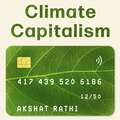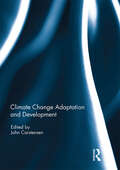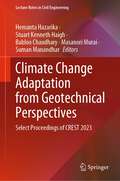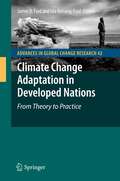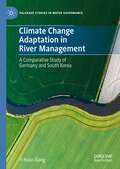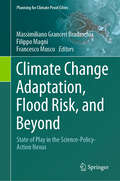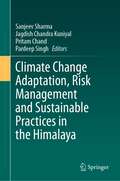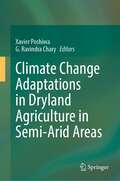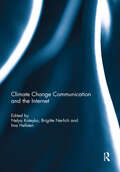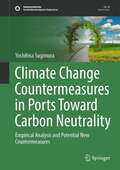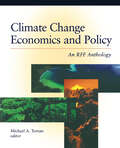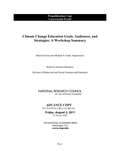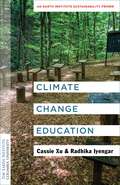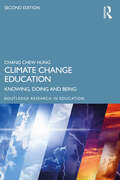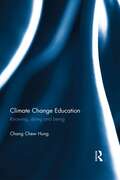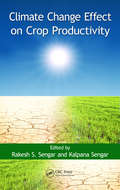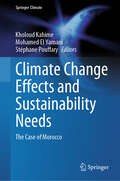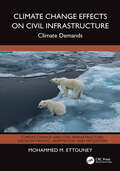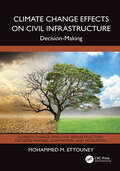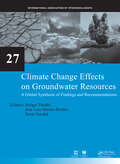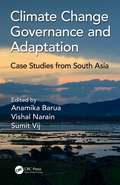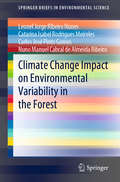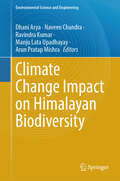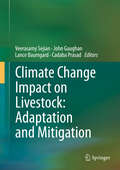- Table View
- List View
Climate Capitalism: Winning the Global Race to Zero Emissions / "An important read for anyone in need of optimism" Bill Gates
by Akshat RathiTen inspiring breakthroughs from inside the global race towards zero emissions.It's now cheaper to save the world than destroy it.Our age will be defined by the climate emergency. But contrary to the doomist narrative that's taken hold, the world has already begun deploying the solutions needed to deal with it. On a journey across five continents, Climate Capitalism tracks the unlikely heroes driving the fight against climate change. From the Chinese bureaucrat who did more to make electric cars a reality than Elon Musk, to the Danish students who helped to build the world's longest-operating wind turbine, or the American oil executive building the technology that can reverse climate damages, we meet the people working to scale technologies that are finally able to bend the emissions curve. Through stories that bring people, policy and technology together, Akshat Rathi reveals how the green economy is not only possible, but profitable. This inspiring blend of business, science, and history provides the framework for ensuring that future generations can live in prosperity and that the wheels of progress don't falter.(P)2023 Hodder & Stoughton Limited
Climate Change Adaptation and Development
by John CarstensenClimate change is real and it is man-made. We have put so many greenhouse gas pollutants into the atmosphere that we will see significant and long-term change that we need to adapt and adjust to. It is important for development practitioners to understand these impacts and the challenge of how and when to adapt to climate change.There are plenty of grim presentations of what the extremes of the possible climate scenarios will throw at us over the next 100 years, but not all change will be disastrous; some change will be beneficial, but much of the change will happen at an unprecedented rate that will require the best possible analysis and understanding of how and when we should adapt to climate change.This is important for development practitioners as we invest in ensuring that poverty is reduced and eliminated and the well-being of everyone is improved. Many countries and communities around the world are vulnerable to the impacts of climate change, but developing economies may on one hand be less resilient to the impact, but could on the other hand be in a better position to make their development climate smart by making the most efficient use of their economic resources.The chapters in this book shine a light on the complexity and the multi-dimensional aspects of climate change adaptation. They gather some of the experiences of addressing climate change impacts in a development context. This book was previously published as a special issue of Development in Practice.
Climate Change Adaptation from Geotechnical Perspectives: Select Proceedings of CREST 2023 (Lecture Notes in Civil Engineering #447)
by Hemanta Hazarika Stuart Kenneth Haigh Babloo Chaudhary Masanori Murai Suman ManandharThis book presents select proceedings of the 2nd International Conference on Construction Resources for Environmentally Sustainable Technologies (CREST 2023), and focuses on sustainability, promotion of new ideas and innovations in design, construction and maintenance of geotechnical structures with the aim of contributing towards climate change adaptation and disaster resiliency to meet the UN Sustainable Development Goals (SDGs). It presents latest research, information, technological advancement, practical challenges encountered, and solutions adopted in the field of geotechnical engineering for sustainable infrastructure towards climate change adaptation. This volume will be of interest to those in academia and industry alike.
Climate Change Adaptation in Developed Nations: From Theory to Practice (Advances in Global Change Research #42)
by James D. Ford Lea Berrang-FordIt is now widely accepted that adaptation will be necessary if we are to manage the risks posed by climate change. What we know about adaptation, however, is limited. While there is a well established body of scholarship proposing assessment approaches and explaining concepts, few studies have examined if and how adaptation is taking place at a national or regional level.
Climate Change Adaptation in River Management: A Comparative Study of Germany and South Korea (Palgrave Studies in Water Governance: Policy and Practice)
by Yi hyun KangThis book examines the approaches to climate change adaptation in water governance taken by South Korea and Germany. By comparing their political decision-making processes, this book explores the factors behind their differences. Adaptation to the changing climate is critical to human society and water is the principal medium through which climate change will affect us. Due to high levels of industrialization and population density, flood control is a high priority in both countries’ adaptation plans. While South Korea has maintained its engineering-oriented flood control policy for river management, Germany has turned its direction from its long-standing technical approach to more nature-based solutions. The evidence of this study indicates that policy change and stability is the result of discourse and institutional interaction, and thus emphasizes the validity of discursive institutionalism. This book will clearly explain why certain policies are adopted for water management and will be an invaluable contribution to the expanding literature on the socio-political aspects of climate change adaptation.
Climate Change Adaptation, Flood Risk, and Beyond: State of Play in the Science-Policy-Action Nexus (Planning for Climate Proof Cities)
by Francesco Musco Massimiliano Granceri Bradaschia Filippo MagniThis book includes the insights of a seminar that was held at IUAV University of Venice, on May 29th and 30th featuring 10 speakers. 8 speakers, 2 moderators, and 1 organizer from the seminar, plus 10 other authors contributed to this book. The writers’ expertise spans from local climate adaptation planning, public policy analysis, climate and environmental finance, and climate adaptation advocacy to multi-risk analysis, GIS, disaster risk management, ecosystem services assessment, urban geography, art, and civic engagement. The book contents address adaptation and flood risk mitigation along the Science-Policy-Action path - both theoretical and operative perspectives are discussed. EU climate adaptation policy and finance, climate adaptation implementation, flood risk analysis, nature-based solutions, blue ecosystem services, regional adaptation planning, and critical infrastructure adaptation are the topics investigated in depth by the writers.
Climate Change Adaptation, Risk Management and Sustainable Practices in the Himalaya
by Sanjeev Sharma Pardeep Singh Jagdish Chandra Kuniyal Pritam ChandThis volume analyzes ecological and socio-economic risks due to climate change in the Himalayan mountain ecosystems, communities, and proposes adaptation strategies and sustainability practices. In order to better understand the potential actions required to improve natural resource conservation and the development of mountain people's livelihoods. The authors discuss the current status of local knowledge system on various environmental aspects of conservation and sustainable use of mountain resources in the Himalaya. The book addresses the institutional capacities, gaps, and priority areas of capacity building to strengthen policies and governance in regard to climate change, landuse management, biodiversity conservation, and sustainable management in the Himalayan region. The aim of this book is to enhance coordination building among policymakers, planners, mountain communities to foster collaboration between different stakeholders by understanding local perceptions of climate change as well as variability issues, and establishing adaptation strategies to cope with these impacts. The chapters incorporate theoretical and applied aspects, and may serve as baseline information for the sustainability of mountain ecosystems through the contribution of multidisciplinary and interdisciplinary expertise from the Himalayan region. The book will be useful for students, teachers, and researchers working in different areas pertaining to mountain ecosystems, as well as policymakers and planners working on issues related to the sustainability of the mountain ecosystem.
Climate Change Adaptations in Dryland Agriculture in Semi-Arid Areas
by G. Ravindra Chary Xavier PoshiwaThis book highlights the approaches for achieving trans-disciplinary research integration for “semi-arid dryland agriculture systems” under changing climates, while also identifying the elements of a collaborative research agenda that are needed to advance global food security. The book emphasizes climate change being a reality and how drylands are bearing the brunt in diverse ways. The major impact of dryland agriculture is on communities that need to: avoid the short- and long-term impacts of the changing climate; adapt strategies that can minimize these impacts; and be able to mitigate climate change, for which they need climate smart interventions. These interventions are only realized through knowledge and experience sharing among stakeholders from different sectors and backgrounds. It is in this context that the publication was seen as a necessity in order to bring together ideas that will transform lives and build adaptation capacities, thereby providing the much-needed products in communities leading to development
Climate Change Communication and the Internet
by Nelya Koteyko, Brigitte Nerlich and Iina HellstenThe volume provides a timely, state of the art collection of studies examining climate change communication in the era of digital media. The chapters focus on a broad range of topics covering various aspects of both practice and research in climate change communication, ranging from the use of online platforms, to blogs, and social networking sites. Climate change communication has increasingly moved into Internet-based forums, and this volume provides a comprehensive overview of research into Internet and climate change communication. The studies share valuable methodological insights in this relatively new field of research and shed light on the opportunities and challenges underlying the collection and analysis of online climate change-related data. This book was previously published as a special issue of Environmental Communication.
Climate Change Countermeasures in Ports Toward Carbon Neutrality: Empirical Analysis and Potential New Countermeasures (Sustainable Development Goals Series)
by Yoshihisa SugimuraThis book presents an in-depth examination of the challenges facing the port industry in reducing CO2 emissions. Through empirical studies and real-world data, it explores the energy consumption of cargo handling machinery and reefer containers, and introduces new technologies and methods for reducing emissions. With a focus on practical application, the book provides a valuable resource for port managers and stakeholders looking to implement effective climate change countermeasures. It also serves as a valuable resource for researchers studying ports and climate change.
Climate Change Economics and Policy: An RFF Anthology
by Michael A. TomanWhat are the potential adverse impacts of climate change? How can society determine the amount of protection against climate change that is warranted, given the benefits and costs of various policies? In concise, informative chapters, Climate Economics and Policy considers the key issues involved in one of the most important policy debates of our time. Beginning with an overview and policy history, it explores the potential impact of climate change on a variety of domains, including water resources, agriculture, and forests. The contributors then provide assessments of policies that will affect greenhouse gas emissions, including electricity restructuring, carbon sequestration in forests, and early reduction programs. In considering both domestic and international policy options, the authors examine command and control strategies, energy efficiency opportunities, taxes, emissions trading, subsidy reform, and inducements for technological progress. Both policymakers and the general public will find this volume to be a convenient and authoritative guide to climate change risk and policy. It is a useful resource for professional education programs, and an important addition for college courses in environmental economics and environmental studies. Climate Economics and Policy is a collection of Issue Briefs, prepared by the staff of Resources for the Future (RFF) and outside experts. Many are adapted from pieces originally disseminated on Weathervane, RFF‘s acclaimed web site on global climate change.
Climate Change Education
by National Research Council Division of Behavioral and Social Sciences and Education Board on Environmental Change and Society Board on Science Education Michael A. Feder Sherrie ForestThe global scientific and policy community now unequivocally accepts that human activities cause global climate change. Although information on climate change is readily available, the nation still seems unprepared or unwilling to respond effectively to climate change, due partly to a general lack of public understanding of climate change issues and opportunities for effective responses. The reality of global climate change lends increasing urgency to the need for effective education on earth system science, as well as on the human and behavioral dimensions of climate change, from broad societal action to smart energy choices at the household level. The public's limited understanding of climate change is partly the result of four critical challenges that have slowed development and delivery of effective climate change education. As one response to these challenges, Congress, in its 2009 and 2010 appropriation process, requested that the National Science Foundation (NSF) create a program in climate change education to provide funding to external grantees to improve climate change education in the United States. To support and strengthen these education initiatives, the Board on Science Education of the National Research Council (NRC) created the Climate Change Education Roundtable. The Roundtable convened two workshops. Climate Change Education Goals, Audiences, and Strategies is a summary of the discussions and presentations from the first workshop, held October 21 and 22, 2010. This report focuses on two primary topics: public understanding and decision maker support. It should be viewed as an initial step in examining the research on climate change and applying it in specific policy circumstances.
Climate Change Education: An Earth Institute Sustainability Primer (Columbia University Earth Institute Sustainability Primers)
by Radhika Iyengar Luo Cassie XuClimate change affects every person and society, every community and industry. Education at all levels, in all disciplines, and both inside and outside official institutions must now address climate change and its many effects on social and environmental systems. This book provides a framework for putting climate change at the forefront of educational agendas and pedagogical tools for teaching climate science across local and global settings.Cassie Xu and Radhika Iyengar present evidence-based teaching practices and strategies that are grounded in a broad conception of education and emphasize a systems approach. They share examples of effective approaches in diverse learning environments—not just in classrooms and other formal settings but also informal contexts with communities and families. This book makes the case that students and other learners need to understand climate science and the physical and social impacts of climate change not only to be good citizens but also to be well prepared for different career paths. Xu and Iyengar highlight systemic barriers and inequalities, reflecting on how to bring marginalized voices and perspectives into educational spaces. Providing a foundation for interdisciplinary environmental education, this book underscores that how we teach future generations about climate change will shape our future.
Climate Change Education: Knowing, Doing and Being (Routledge Research in Education)
by Chang Chew HungClimate change is complex and there is a need to educate our future generations so that they are able to deal with the plethora of information and views that they come into contact with in their lives. This book inquires into what it means to teach and learn about climate change. Now in its second edition, Chang further explores what education for climate change entails, discussing the concept of climate change education (CCE) itself, how it is taught in schools and how public education is being carried out. Featuring updated literature in a quickly advancing field, the book defines CCE for the global citizen and looks at pedagogies supporting CCE. It also identifies teachers as key stakeholders in climate change discourse, how to improve teacher readiness on the topic and how teacher professional development can support successful implementation of CCE. This book will be invaluable to climate change educators and can act as a reference resource for teachers, education policymakers and public education agencies.
Climate Change Education: Knowing, doing and being (Routledge Research in Education)
by Chang Chew HungClimate change is a controversial topic; some people assert that climate change is not occurring, and others believe that reports are inaccurate, that whilst climate change is happening, it may not be caused by human activity. There are also climate alarmists who use IPCC reports to support their claims that erratic weather patterns are a result of climate change caused by human activity. Regardless of these different viewpoints, one fact can be agreed upon; climate change is a complex subject and there is a need to educate future generations, enabling them to deal with the plethora of information and views that they will experience in their lives. This book explores what education for climate change entails, discussing the concept of Climate Change Education (CCE) itself, how it can be taught in schools and how public education can be carried out. It instructs what specific subject matter to teach for CCE, and how to evaluate the student learning on the subject. Chapters include: CCE in the Formal Curriculum Teacher readiness for CCE Assessment for and of CCE Lessons from CCE for Public Education Climate Change Education is an extremely useful resource for anyone involved in educating students on climate change and also for those interested in climate change itself.
Climate Change Effect on Crop Productivity
by Rakesh S. Sengar Kalpana SengarExplore the Relationship between Crop and ClimateAgricultural sustainability has been gaining prominence in recent years and is now becoming the focal point of modern agriculture. Recognizing that crop production is very sensitive to climate change, Climate Change Effect on Crop Productivity explores this timely topic in-depth. Incorporating contri
Climate Change Effects and Sustainability Needs: The Case of Morocco (Springer Climate)
by Kholoud Kahime Mohamed El Yamani Stéphane PouffaryThis book provides simultaneously, a cross-sectoral, multi-scale assessment of climate change issues in Morocco and proposes levers of action and innovative practices to be used to strengthen the resilience and adaptation strategies. The book offers the opportunity to debate contemporary mutations, the paradigms of change as a complex process, the dynamics of values, the complexity of the issues and the opportunities for transformation, starting from a reflective approach on the historical, scientific, theoretical and strategic dimensions of action, creativity and environmental innovation in a perspective of sustainability.
Climate Change Effects on Civil Infrastructure: Climate Demands (Climate Change and Civil Infrastructure)
by Mohammed M. EttouneyClimate change challenges are unlike any hazard that infrastructure and related shareholders have faced for millennia. These challenges, and the systems that are vulnerable to them, as well as the resulting consequences (social, economic, physical, natural, health, costs, etc.), are interrelated in countless ways and span regions, countries, oceans, and continents. The design, analysis, maintenance, operations, economics, and life cycle of civil infrastructure are dependent upon climatic effects, and this book addresses the intersections between climate change, infrastructures, and related decision paradigms, such as risk, resilience, preparedness, adaptation, or mitigation, from the viewpoint of climate change demands. Presents an objective categorization of climate change demands as related to civil infrastructure and society. Offers a comprehensive roadmap on how to plan for and address climate change effects on civil infrastructure. Includes numerous objective and practical case studies throughout to highlight important subjects.
Climate Change Effects on Civil Infrastructure: Decision-Making (Climate Change and Civil Infrastructure)
by Mohammed M. EttouneyThe design, analysis, maintenance, operations, economics, and life cycle of civil infrastructure is very dependent upon climatic effects. Climate change can have immense effects on the performance and well-being of civil infrastructures, and this book examines how climate change can directly affect civil infrastructure, how different types of infrastructure are affected, and more importantly, how stakeholders can prepare for and counter such changes and approach decision-making in an optimal manner. It includes numerous case studies and examples that help illustrate the different points and methodologies presented. Presents a comprehensive road map on how to plan for and address climate change effects on civil infrastructure. Includes case studies and examples that help illustrate the different points and methodologies presented. Presents numerous theoretical and analytical tools to establish potential impacts. Examines the changes in demands, increased vulnerabilities (or capacity decrease), consequences, and potential links between all of those factors.
Climate Change Effects on Groundwater Resources: A Global Synthesis of Findings and Recommendations (IAH - International Contributions to Hydrogeology)
by Holger Treidel & Jose Luis Martin-Bordes Jason J. GurdakClimate change is expected to modify the hydrological cycle and affect freshwater resources. Groundwater is a critical source of fresh drinking water for almost half of the worlds population and it also supplies irrigated agriculture. Groundwater is also important in sustaining streams, lakes, wetlands, and associated ecosystems. But despite this,
Climate Change Geoengineering
by Wil C. G. Burns Andrew L. StraussThe international community is not taking the action necessary to avert dangerous increases in greenhouse gases. Facing a potentially bleak future, the question that confronts humanity is whether the best of bad alternatives may be to counter global warming through human-engineered climate interventions. In this book, eleven prominent authorities on climate change consider the legal, policy, and philosophical issues presented by geoengineering. The book asks: When, if ever, are decisions to embark on potentially risky climate modification projects justified? If such decisions can be justified, in a world without a central governing authority, who should authorize such projects and by what moral and legal right? If states or private actors undertake geoengineering ventures absent the blessing of the international community, what recourse do the rest of us have?
Climate Change Governance and Adaptation: Case Studies from South Asia
by Anamika Barua, Vishal Narain and Sumit VijClimate change adaptation in South Asia is redefining the roles of different actors in the governance processes. The existing governance lack capacity, knowledge, and leadership skills to manage the uncertainties and challenges posed by climate change. This book aims to explain how the governance of climate change adaptation and mitigation is being shaped in the region and how climate change is impacting upon the governance of natural resources. Although the focus is on South Asia, the editors draw a wide range of contributions from northern and southern communities and across various agro-ecological contexts. Climate Change Governance and Adaptation: Case Studies from South Asia sees the changing climate not only as an environmental problem but as a societal challenge and discusses the governance challenges from an interdisciplinary social science perspective across different levels: local, state, and national. Discusses also the challenges and opportunities for increasing the resilience of the society through effective governance around climate change. A top down approach to govern climate change adaptation may not yield desired outcomes; instead the book emphasizes the need to integrate issues of equity, into climate governance and polices. The lessons learned from different cases across South Asia help readers have a better and deeper understanding of the relationships between governance and climate change. Given the diversity of themes covered, this book will appeal not only to researchers and practitioners in the climate change community, but also to those with a broader interest in governance processes.
Climate Change Impact on Environmental Variability in the Forest (SpringerBriefs in Environmental Science)
by Leonel Jorge Nunes Catarina Isabel Meireles Carlos José Pinto Gomes Nuno Manuel de Almeida RibeiroThis book discusses the impact of climate change on rural forest areas. It analyses data provided by the Portuguese Institute of the Sea and Atmosphere (IPMA) to not only demonstrate that climate change has occurred in Portuguese forests, but also to suggest how forestry practices can be adapted to minimise its effects. In turn, the book distils data collected over several years into a comprehensive and coherent review of the ways in which the climate has changed in Portugal. It addresses the changes in rainfall, temperatures, and climatic anomalies, and how these changes correlate with effects such as rural forest fires. Though the text chiefly focuses on Portugal, the tools implemented are easily transferable to other countries and regions, making it relevant to readers around the globe. The book offers a valuable asset for students, researchers, foresters and those working at environmental (research) institutions.
Climate Change Impact on Himalayan Biodiversity (Environmental Science and Engineering)
by Ravindra Kumar Naveen Chandra Arun Pratap Mishra Dhani Arya Manju Lata UpadhayayThis book is an informative and profound book that explores the impact of climate change on the unique and delicate environment of the Himalayan region. The book meticulously examines the different plants and animals that live there and how they are affected by changing temperatures and weather patterns. The book showcases how species are changing their habits and distribution patterns and what this means for the future of the Himalayan environment. The book also provides practical suggestions for how local communities and policymakers can work together to protect the region's biodiversity for the future. Overall, this book is an excellent resource for researchers and academics who are interested in learning more about the environmental impacts of climate change on the Himalayan region. The book is written in a clear and accessible manner, making it easy for anyone to understand the profound implications of climate change on this unique and sensitive environment.
Climate Change Impact on Livestock: Adaptation and Mitigation
by Veerasamy Sejian John Gaughan Lance Baumgard Cadaba PrasadThis volume addresses in detail both livestock's role in climate change and the impacts of climate change on livestock production and reproduction. Apart from these cardinal principles of climate change and livestock production, this volume also examines the various strategies used to mitigate livestock-related GHG emissions, and those which can reduce the impacts of climate change on livestock production and reproduction. Presenting information and case studies collected and analyzed by professionals working in diversified ecological zones, the book explores the influence of climate change on livestock production across the globe. The most significant feature of this book is that it addresses in detail the different adaptation strategies and identifies targets for different stakeholders in connection with climate change and livestock production. Further, it puts forward development plans that will allow the livestock industries to cope with current climate changes and strategies that will mitigate the effects by 2025. Lastly, it provides researchers and policymakers several researchable priorities to help develop economically viable solutions for livestock production with less GHG emissions, promoting a cleaner environment in which human beings and livestock can live in harmony without adverse effects on productivity. Given that livestock production systems are sensitive to climate change and at the same are themselves a contributor to the phenomenon, climate change has the potential to pose an increasingly formidable challenge to the development of the livestock sector. However, there is a dearth of scientific information on adapting livestock production to the changing climate; as such, well-founded reference material on sustaining livestock production systems under the changing climate scenarios in different agro-ecological zones of the world is essential. By methodically and extensively addressing all aspects of climate change and livestock production, this volume offers a valuable tool for understanding the hidden intricacies of climatic stress and its influence on livestock production.
